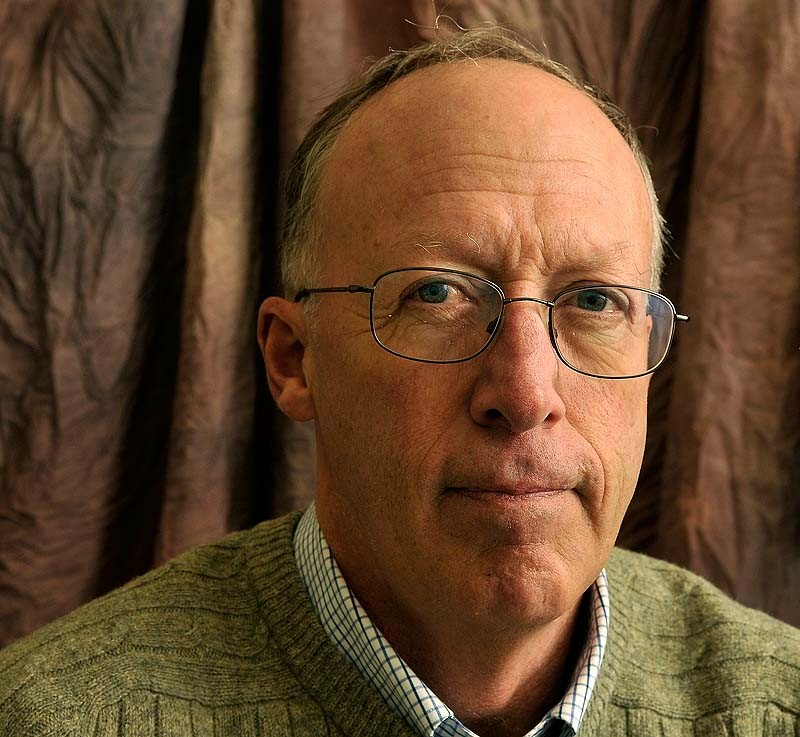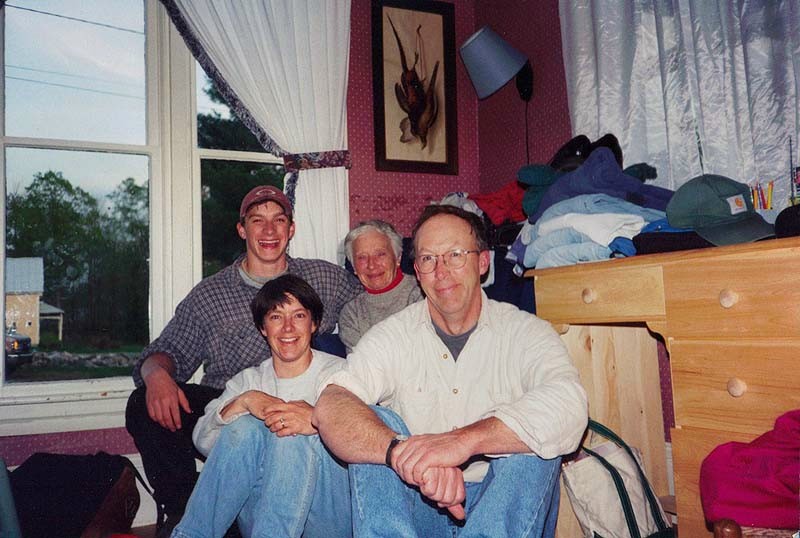During those terrible final days, Joe and Amy Bruce lay awake, side by side, night after night, listening to their son Willy roam around downstairs, ranting to himself.
Their minds raced, searching for an unknown solution, unable to imagine how they might end the turmoil that had engulfed their home in rural Caratunk, near Greenville.
For several years, the Bruces had struggled to get good, consistent mental health care for Willy, who was diagnosed with paranoid schizophrenia but fought treatment.
Their torment peaked in the weeks before the 2006 tragedy that would rend the Bruce family forever and propel Joe Bruce to become a nationally recognized advocate for families of the mentally ill. Willy wasn’t shot and killed by police like others profiled in this Press Herald series, but the Bruces’ experience mirrors the challenges faced by many families with mentally ill loved ones.
Willy, then 24, had never been so sick, so disconnected from reality. But the Bruces had run out of options, frustrated by a mental health care system and privacy laws that allowed their adult son to exclude them from any involvement in or knowledge of his treatment.
Amy Bruce, who was the town treasurer, captured the couple’s mounting agony and regret in a letter she wrote to her son, urging him to resume treatment. Joe Bruce found the letter, tucked in his wife’s wallet, several weeks after Willy killed her.
“Please, please, please try to realize that your father and I are doing the best we can,” she scrawled on yellow lined paper. “We truly don’t know what else to do. You have got to help us, Will. I know you have reason to doubt our ability to protect you, but please give this a chance.”
In March 2006, assisted by a patient advocate, Willy Bruce had secured his own release from the Riverview Psychiatric Center in Augusta without anti-psychotic medications or a treatment plan. A few weeks later, as he always did, Willy showed up at his parents’ house and began the hellish descent toward a bloody catastrophe that drew national news coverage.
Awake for days at a time, Willy regularly ventured outside to smoke, lighting up in the woodshed and snubbing out cigarettes in the sawdust. Often, he walked circles in the driveway, shouting nonsense at a silent audience of trees. He smashed a bathroom mirror, hid kitchen knives in his bedroom, wore his clothes inside out on purpose, slicked back his hair with olive oil – inexplicable acts that sprang from the mania that consumed him.
“I spent hours trying to reason with him,” Joe Bruce, 60, recalled recently. “He believed that his mother and I were conspiring to have him committed. Well, yes, we were, because we thought he needed help. But by that time, he didn’t want us involved in his treatment at all. We were just kind of waiting.”
On June 20, 2006, their wait ended. Willy Bruce killed his mother with a hatchet, believing that she was affiliated with al-Qaida. Joe Bruce, who then worked for the Maine Department of Transportation, came home to find Amy’s battered body in the bathtub.
The next day, police arrested Willy Bruce without incident outside his grandparents’ house in South Portland. In March 2007, he was found not criminally responsible by reason of major mental illness. He was committed to Riverview for an indefinite period and remains there today.
In the wake of a tragedy that would have destroyed most people, Joe Bruce became an outspoken national advocate for families of the mentally ill. He helped to legalize court-ordered assisted outpatient treatment in Maine as an alternative to hospitalization and received a commendation from the national Treatment Advocacy Center in 2009 for his efforts.
But six years after his wife’s death, Bruce believes little has changed and nothing more has been done to help families of mentally ill adults navigate Maine’s mental health care system.
“The system is still a wreck,” Bruce said recently. “The pendulum has swung too far in the wrong direction. Families really get no help at all. They’re often totally shut out. They can’t find out where a loved one is, let alone whether he’s getting treatment.”
Others familiar with Maine’s mental health care system point to some improvements, but they agree with Bruce.
“It’s still really difficult for family members,” said Carol Carothers, executive director of the National Alliance on Mental Illness in Maine. “I’ve known parents with full guardianship (of a mentally ill adult) and some care providers still wouldn’t talk to them.”
In the years since Amy Bruce’s death, the Maine Department of Health and Human Services has taken steps to improve treatment and release policies at Riverview to prevent a similar tragedy, according to state officials and mental health advocates.
However, the department also has experienced budget curtailments totaling $12.4 million in the fiscal years 2008 to 2012, according to spokesman John Martins. The department was unable to provide total mental health care spending data for that period, including federal Medicaid claims, which are currently being collected and analyzed.
Despite a 10 percent increase in demand for public mental health services nationally – one in four American adults has some form of mental illness – Maine reduced annual spending in this area from $201 million in fiscal 2008 to $174 million in fiscal 2012.
Yet Maine has done better than most states in taking care of the mentally ill, according to NAMI. It was one of only six states to get a B grade in the advocacy group’s 2009 report card on the states. No state got an A. Maine won points for having one of the lowest uninsured rates in the nation and because its Dirigo health plan provides equal coverage for mental illness and substance abuse disorders.
In August, the agency combined its adult mental health and substance abuse divisions, creating the Office of Substance Abuse and Mental Health Services. Director Guy Cousins said the move mirrors a trend in medical care that recognizes the links between the two health issues.
In 2010, the Maine Legislature, pressed by Bruce and other mental health care advocates, adopted a Progressive Treatment Program, commonly known as assisted outpatient treatment.
The program allows a judge to order community-based mental health care, including monitored medication, as an alternative to commitment to a psychiatric hospital or involvement in the criminal justice system.
However, as Maine’s program is written, Bruce said, its effectiveness is questionable for the 40 percent to 50 percent of seriously mentally ill people who have anosognosia, a neurological condition that leads them to deny their illness. Family members without legal guardianship have no additional power to compel an unwilling loved one to attend a commitment hearing, where assisted outpatient treatment may be considered as an option.
To help families and others better access mental health care in Maine, NAMI Maine recently convened a task force and issued a written guide for consumers, family members, caregivers and police. It outlines the laws pertaining to the mentally ill, including individual privacy protections.
“It doesn’t fix the way people misinterpret the law, but it does attempt to explain it,” Carothers said. “When it comes to protecting privacy rights, my sense is (care providers) don’t know what they can (say to family members), so they don’t (say) anything.”
Carothers noted that the state pays NAMI Maine and other nonprofit agencies to provide assistance to families of the mentally ill.
NAMI, in particular, will receive $2.8 million in state and federal funding this fiscal year to provide contracted services for mentally ill people and their families, including $340,000 for family support and public education, according to DHHS.
Carothers acknowledged that, for families, NAMI’s role consists of providing information and referrals to available resources.
“My business is to provide information,” Carothers said. “Many families don’t know what resources exist.”
Bruce said information offered by NAMI and other agencies isn’t enough. He believes the state should provide family advocates, similar to those provided for psychiatric patients, to help families navigate the often confusing legal and medical hurdles of the mental health care system.
“There’s a big difference between providing information and advocacy,” Bruce said. “Information is nice, but a lot of people don’t even know where to go or what to ask. We went to NAMI meetings. We met a lot of people like us. That didn’t really help us much.”
Few people have the legal or medical background necessary to advocate successfully for a family member in psychiatric crisis, Bruce said. Families need advocates to help them get the best care for their loved ones, even when their loved ones fight it, he said.
Family advocates, he said, would help others avoid his experience.
“I never should have come home to find my wife slaughtered,” he said.
Send questions/comments to the editors.




Success. Please wait for the page to reload. If the page does not reload within 5 seconds, please refresh the page.
Enter your email and password to access comments.
Hi, to comment on stories you must . This profile is in addition to your subscription and website login.
Already have a commenting profile? .
Invalid username/password.
Please check your email to confirm and complete your registration.
Only subscribers are eligible to post comments. Please subscribe or login first for digital access. Here’s why.
Use the form below to reset your password. When you've submitted your account email, we will send an email with a reset code.